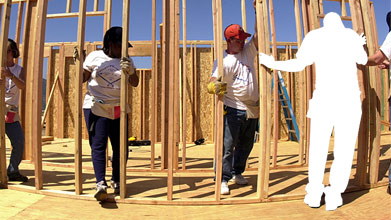Congratulations on going to Urbana! I hope God spoke to you there. I hope you gained a greater vision for the global Body of Christ, and for your role in God’s global mission. If it hasn’t already, there’s a good chance that your path in missions will include a short term missions program. If you haven't already had to, there’s a good chance you’ll need to avoid some pitfalls along the way, especially the pitfall of fear.
Maybe it’s fear of not contributing well. Maybe it’s fear that you’ll be pushed so far past your comfort zone you’ll just shut down. Maybe, for you, it’s fear of getting sick, or not serving others as you intend, or that the trip will be a bad fit for your skills or your vocation. Whatever our fears, they will bring us to a point of decision: either we will face our fears and decide God is big enough to meet us in the challenge, whatever it is. Or, we will become paralyzed and not go, perhaps convincing ourselves we weren’t called to go after all.
Whatever our fears, they will bring us to a point of decision: either we will face our fears and decide God is big enough to meet us in the challenge, whatever it is. Or, we will become paralyzed and not go, perhaps convincing ourselves we weren’t called to go after all. But the Scriptures don’t really leave room for that option.
But the Scriptures don’t really leave room for that option. Jesus has called his disciples—all of his disciples—to “Go and make disciples of all nations…” We are all commanded to go. We are not commanded to get it right, we are commanded to go.
This is not to say that we don’t need to prepare, or that we don’t need to try to do missions well. We must do what we can to go well, we must learn from our mistakes. For example, books like When Helping Hurts by Corbett and Fikkert, Radical by David Platt, and Western Christians in Global Mission by Borthwick have much to teach us about wise mission practices.
Tapping in to our collective knowledge, we now know that bringing charitable resources and aide to communities can create dependencies in those we hope to help and thus do more harm than good. We have learned to ask local believers and organizations how the team can serve and learn, rather than focusing on outcomes which gratify our appetites for impressive metrics.
We also know that as North Americans, our optimistic, entrepreneurial, and can-do dispositions can sometimes drown out the salient voices of local church leadership. People in many cultures will seek to honor us as their guests and may ask us to teach or preach or lead while on a short-term mission. But what were once receiving nations in the majority world are now places where Christianity has grown and deepened exponentially. By listening before speaking, North Americans will grow through learning the stories and teachings of our global brothers and sisters who have been through suffering and trial. We have so much to learn from them!
Pursuing wise mission practices and avoiding pitfalls must never keep us from going! If our gifts and skills don’t totally fit, we shouldn’t be surprised; Jesus sent out fishermen, a tax collector, and a former persecutor and they turned the world upside down. God’s strength is made complete in our weakness. God loves to send his people as children and learners, so that fruit of the mission would not be related to our giftedness, but his power at work. Imagine what he can do with us, when we make our lives available to him!
We must answer Jesus’ call to go. We must not let our fears keep us from taking risks, giving our all and living in joyful wholehearted obedience which reflects the very character of our good God.
More than likely we will hit a ditch (or two!) either in a cultural misunderstanding, or hurting when we meant to be helping. The good news is that Jesus is more than capable of pulling us out. He is even capable of turning these ditches into growing experiences for everyone—North Americans and locals alike. But it is through the going—through the pressing into our fears—that we will know his transformative power.
Not helping hurts the global church. The role of North American Christians in the global church may be shifting, but we have not ceased to be a part of the global Body of Christ. We must continue to step out in faith and go and exhibit Jesus’ care and love for his global family. We must continue to actively partner with the least of Jesus’ brothers and sisters—going the distance to collaborate in God’s global mission together—because as we care for the least in Jesus’ family, we care for Jesus himself.
